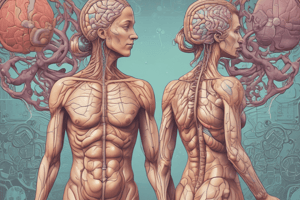Podcast
Questions and Answers
What is a common symptom of mild hyponatremia?
What is a common symptom of mild hyponatremia?
- Nausea (correct)
- Confusion
- Seizures
- Muscle weakness
In the context of hypernatremia, which symptom indicates a severe condition?
In the context of hypernatremia, which symptom indicates a severe condition?
- Irritability
- Muscle weakness (correct)
- Thirst
- Muscle cramps
What scenario best describes hyperkalemia?
What scenario best describes hyperkalemia?
- Too much potassium causing potential overload (correct)
- Low sodium resulting in faintness
- Too little potassium causing electrical issues
- Excessive sodium leading to thirst
Which of the following reflects a symptom of moderate hypokalemia?
Which of the following reflects a symptom of moderate hypokalemia?
What is the primary issue associated with low sodium levels in hyponatremia?
What is the primary issue associated with low sodium levels in hyponatremia?
Which symptom indicates mild hyperkalemia?
Which symptom indicates mild hyperkalemia?
What severe symptom can arise from hypokalemia?
What severe symptom can arise from hypokalemia?
How does excessive sodium affect individuals with hypernatremia?
How does excessive sodium affect individuals with hypernatremia?
Flashcards are hidden until you start studying
Study Notes
Hyponatremia (Low Sodium)
- Occurs when sodium levels are insufficient in extracellular fluid.
- Symptoms reflect a party analogy: inadequate salt leads to unhappy guests (cells).
- Mild symptoms: fatigue, nausea, headache.
- Moderate symptoms: confusion, reduced attention, unsteady gait.
- Severe symptoms: seizures, coma, respiratory distress.
Hypernatremia (High Sodium)
- Results from excess sodium in extracellular fluid.
- Symptoms illustrate a party with too much salt causing guests to feel thirsty.
- Mild symptoms: thirst, dry mouth.
- Moderate symptoms: irritability, restlessness.
- Severe symptoms: muscle spasms, coma.
Hyperkalemia (High Potassium)
- High potassium levels can overload electrical systems.
- Symptoms indicate potential chaos from overloaded wires (cells).
- Mild symptoms: fatigue, weakness, abnormal sensations.
- Moderate symptoms: muscle weakness, arrhythmia, palpitations.
- Severe symptoms: cardiac arrest, paralysis.
Hypokalemia (Low Potassium)
- Occurs when potassium is deficient in extracellular fluid.
- Symptoms suggest malfunctioning electrical systems due to low current.
- Mild symptoms: fatigue, muscle weakness, constipation.
- Moderate symptoms: arrhythmia, cramps, reduced reflexes.
- Severe symptoms: difficulty breathing, cardiac arrest, paralysis.
Summary Insights
- Hyponatremia: Insufficient sodium affects cellular function, leading to discomfort.
- Hypernatremia: Excess sodium increases thirst and irritability among cells.
- Hyperkalemia: Overloaded potassium can result in dangerous heart irregularities.
- Hypokalemia: Lack of potassium disrupts normal cellular operation and may lead to serious complications.
Studying That Suits You
Use AI to generate personalized quizzes and flashcards to suit your learning preferences.




